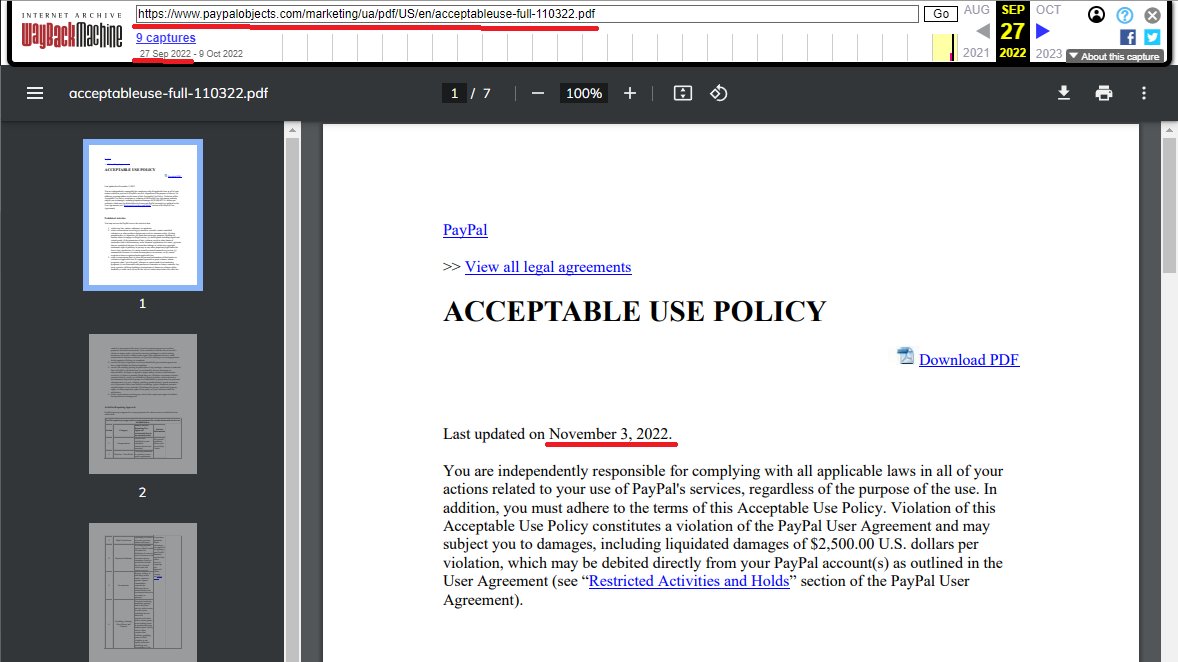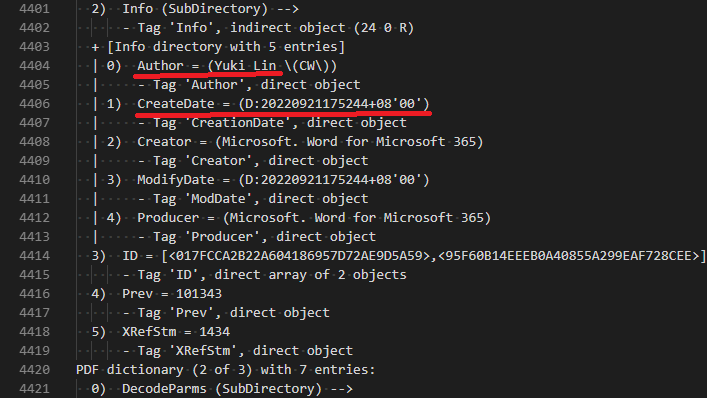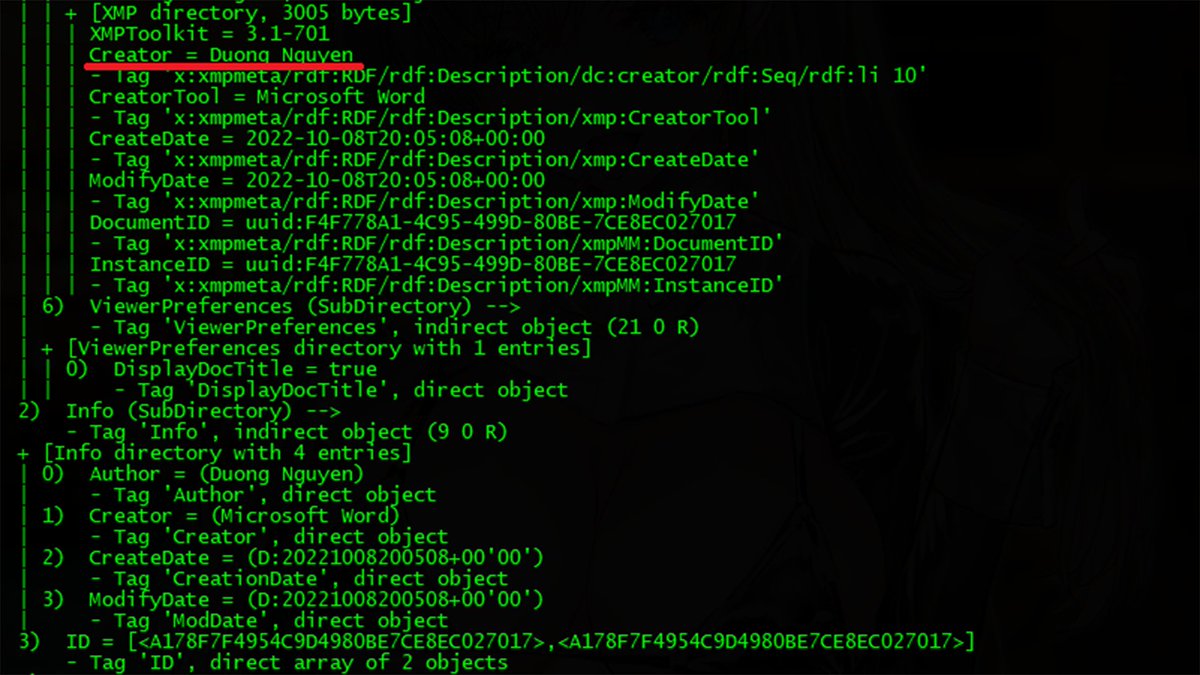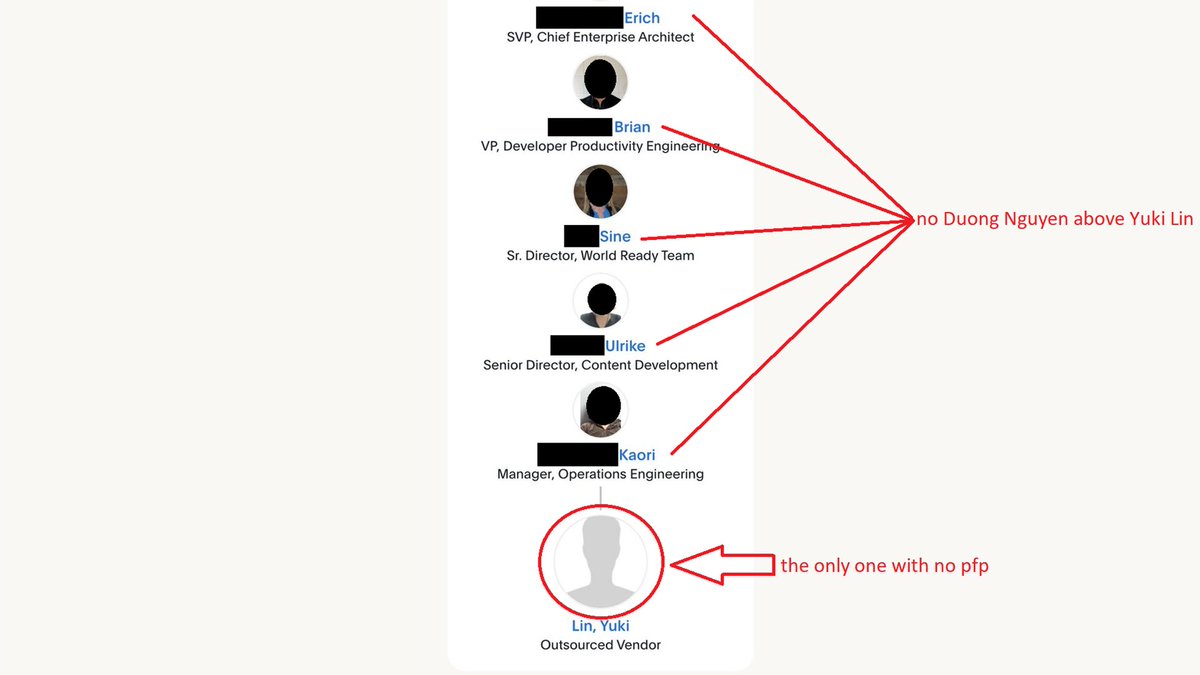I have irrefutable evidence @PayPal is lying!
They say the notice went out in error, but it was uploaded to their website since at least Tue., 27 Sep. 2022 22:33:12 UTC, as attested by archive.org here: web.archive.org/web/2022092722….
(I even found out who wrote it 👇)
They say the notice went out in error, but it was uploaded to their website since at least Tue., 27 Sep. 2022 22:33:12 UTC, as attested by archive.org here: web.archive.org/web/2022092722….
(I even found out who wrote it 👇)

So there is proof from two archival services this notice was prepared *at least* 1 week in advance and was already pre-filled with the date it was prepared to go public.
Although it is strange they wrote “Last updated on November 3, 2022” even though it was still September.
Although it is strange they wrote “Last updated on November 3, 2022” even though it was still September.
But wait, there is more!
I downloaded the file and checked the metadata.
You can see the author is a person named Yuki Lin. And you can see she has been working on this document since 2022.09.21 17:52:44 UTC+08.
I downloaded the file and checked the metadata.
You can see the author is a person named Yuki Lin. And you can see she has been working on this document since 2022.09.21 17:52:44 UTC+08.

So they have been working on this document for almost two weeks before it went public, and it was finalized and sitting on their website with the date of publication already filled in for at least a week.
Mistake? You decide.
(below is the UTC+8 map, where it was written)
Mistake? You decide.
(below is the UTC+8 map, where it was written)

Good job, everyone! $PYPL #PayPal 

Tremendous coverage and insight from @TheQuartering on the @PayPal lie.
Thank you for featuring my research, ser! 🫡
Thank you for featuring my research, ser! 🫡
🚨 BREAKING: @PayPal whistleblower comes forward!
Exclusive information on Yuki Lin (the faceless author of the #PayPal AUP), internal Slack messages, and evidence of something more sinister going on
@TheQuartering @Styx666Official @crabcrawler1 @Timcast @AnnCoulter @hodgetwins
Exclusive information on Yuki Lin (the faceless author of the #PayPal AUP), internal Slack messages, and evidence of something more sinister going on
@TheQuartering @Styx666Official @crabcrawler1 @Timcast @AnnCoulter @hodgetwins

It turns out Yuki Lin, the author of the @PayPal AUP, does not even work at #PayPal. She is an outsourced Chinese vendor working remotely for #PayPal since September 2020. 

Looking at the metadata of the empty document (web.archive.org/web/2022100922…) which replaced the AUP after the public backlash, we can see who was responsible for trying to fix the mistake: Duong Nguyen. 

Lookin at Duong Nguyen’s internal @PayPal profile, we can see how the profile of a proper #PayPal employee looks like. 

Looking at the people directly above Yuki Lin, we can see there is no Duong Nguyen. This means that #PayPal assigned someone from outside the Yuki Lin hierarchy to handle the AUP issue. 

As per my source, there is a long way between Yuki Lin and @PayPal’s higher-ups, so there is the real possibility not everyone in the decision chain approved of the new AUP before it went out.
On the other hand, people directly above Yuki Lin might not be the ones responsible for the decision, as tasks can come from anyone above in the hierarchy, bypassing the decision chain.
So #PayPal needs to conduct an internal investigation to find out who authorized the release.
So #PayPal needs to conduct an internal investigation to find out who authorized the release.
And now for the best (worst?) part: using my autism, I analyzed the metadata of all the documents #PayPal has published since September 2020 (when Yuki Lin came onboard).
You are in for a wild ride!
You are in for a wild ride!

In total, I was able to find 139 public PDFs.
Out of the 139 PDFs I could find, 51 were published by Yuki Lin.
In other words 37% of the legal stuff #PayPal put out since September 2020 was published by a single faceless Chinese entity not even directly on @PayPal’s bankroll.
Out of the 139 PDFs I could find, 51 were published by Yuki Lin.
In other words 37% of the legal stuff #PayPal put out since September 2020 was published by a single faceless Chinese entity not even directly on @PayPal’s bankroll.

But wait, there is more!
Looking at the above list, you can see this Chinese entity has published #PayPal documents in 10 different languages (German, English, Spanish, Estonian, French, Hebrew, Japanese, Portuguese, Sinhala, Chinese)...



Looking at the above list, you can see this Chinese entity has published #PayPal documents in 10 different languages (German, English, Spanish, Estonian, French, Hebrew, Japanese, Portuguese, Sinhala, Chinese)...




...and for 22 different markets (Argentina🇦🇷, Austria🇦🇹, Australia🇦🇺, Brazil🇧🇷, China🇨🇳, Canada🇨🇦, Switzerland🇨🇭, Germany🇩🇪, Estonia🇪🇪, Spain🇪🇸, France🇫🇷, UK🇬🇧, Hong Kong🇭🇰, Israel🇮🇱, Japan🇯🇵, South Korea🇰🇷, Sri Lanka🇱🇰, Mexico🇲🇽, Portugal🇵🇹, Singapore🇸🇬, Taiwan🇹🇼, US🇺🇸). #PayPal
I have archived all the documents published by Yuki Lin using archive.org. You can see all the links in the screenshot below or at rentry.co/yukilin.
Please feel free to go through them and see if she published any other questionable policies. Post below.
Please feel free to go through them and see if she published any other questionable policies. Post below.

Some of the questions that must be answered by #PayPal:
>Who is this Yuki Lin? Is she even a real person?
>Why does she have final say over 37% of @PayPal’s legal documents, covering 10 different languages over 22 countries, while not even being an employee?
>Who is this Yuki Lin? Is she even a real person?
>Why does she have final say over 37% of @PayPal’s legal documents, covering 10 different languages over 22 countries, while not even being an employee?
>Is #PayPal even aware such a powerful person exists within their organization?
>Is there something more sinister going on here? My source took the freedom to speculate, but I will leave that to the reader.
>Is there something more sinister going on here? My source took the freedom to speculate, but I will leave that to the reader.
This is all I could find using publicly-available means. People with more power and access should look more into this. If #PayPal needs my help with the investigation, my DMs are open (my source is anonymous, I do not know his|her identity, so do not contact in regards to that).
I will end by quoting some internal #PayPal Slack messages:
>“I work for EMEA and today I was moved to support NA Async because of this ‘mistake’. 90% of customers queries were to get their accounts closed 😅”
>“I work for EMEA and today I was moved to support NA Async because of this ‘mistake’. 90% of customers queries were to get their accounts closed 😅”
>“I am really surprised and disappointed that there isn’t any official comms on this yet to the employees. there is literally nothing for me to tell my family/friends or the small businesses that aren’t accepting paypal due to this fiasco other than ‘we’ve reversed it now’”
That’s all for now.
If I have any new updates, I will continue to post them in this thread below.
🫡
If I have any new updates, I will continue to post them in this thread below.
🫡
Looks like we’ve also made it to @PointsCommunity with @esaagar and @krystalball. Thank you, everyone!
PS: I’ve had a #PayPal whistleblower come forward with exclusive new updates. Please check the thread above for new information.
PS: I’ve had a #PayPal whistleblower come forward with exclusive new updates. Please check the thread above for new information.
Thank you, @TheQuartering, for the banger update on the #PayPal case.
The SSs are from a whistleblower who privately contacted me. I’ve independently verified they are real before posting.
I’ve DMed you the unredacted versions so you can verify as well.
The SSs are from a whistleblower who privately contacted me. I’ve independently verified they are real before posting.
I’ve DMed you the unredacted versions so you can verify as well.
I’ve just found out this thread was also covered by @Timcast. Thank you, Tim Pool!
PS: I’ve had a #PayPal whistleblower come forward with exclusive new updates. Please check the thread above for new information.
PS: I’ve had a #PayPal whistleblower come forward with exclusive new updates. Please check the thread above for new information.
• • •
Missing some Tweet in this thread? You can try to
force a refresh



















